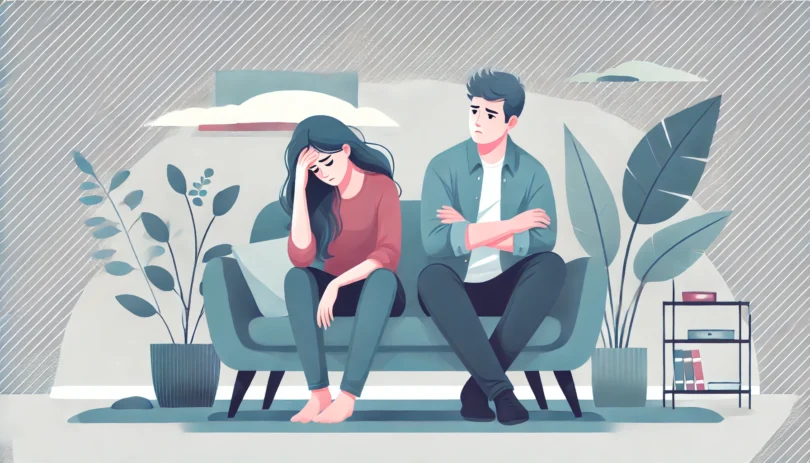Impacts of Depression in Married Life can be devastating for couples and families. Depression, a common mental health condition, can influence emotional, physical, and behavioral dynamics in a relationship. When one partner struggles with depression, it can create challenges such as emotional distance, communication breakdowns, and decreased intimacy. Recognizing and addressing these challenges is essential to maintaining a healthy and supportive marriage.
Understanding Depression in Married Life
Depression is more than just sadness; it’s a prolonged mental state characterized by low mood, lack of interest, and feelings of hopelessness. In married life, depression impacts both partners, leading to frustration, misunderstandings, and a strain on daily life.
Key symptoms of depression that affect relationships:
- Emotional withdrawal
- Fatigue and decreased energy
- Poor communication
- Loss of interest in intimacy
- Increased irritability
For instance: A partner suffering from depression may prefer isolation, which can make the other partner feel neglected and unloved. Over time, these emotional gaps widen.
How Depression Impacts Communication
One of the most significant impacts of depression in married life is the breakdown in communication. Partners may struggle to express their feelings, causing further emotional disconnection.
- Depressed Partner: May not communicate effectively due to lack of energy and emotional numbness.
- Non-Depressed Partner: May feel frustrated or unable to help.
Emotional Distance and Isolation
Depression often leads to emotional distancing between partners. The depressed partner may withdraw emotionally, making it difficult for their spouse to connect.
Signs of Emotional Distance:
- Reduced emotional bonding
- Avoiding conversations or meaningful interactions
- Spending less time together
Example: A husband struggling with depression may stop engaging in shared activities, leading to emotional loneliness for his wife.
Impacts on Intimacy
Depression often affects physical intimacy in relationships. The lack of interest in sexual activity, physical affection, and shared closeness can create emotional barriers.
- Low Libido: Depression lowers the desire for intimacy.
- Lack of Affection: Physical gestures like hugs, kisses, and holding hands become infrequent.
Financial and Domestic Struggles
When depression affects one partner, it can cause financial and domestic difficulties:
- Reduced Work Performance: A depressed partner may struggle with work, resulting in income loss.
- Household Chores: Managing daily tasks becomes harder for the depressed individual, creating resentment in the spouse.
Impact on Parenting
If a couple has children, depression can affect their parenting styles and overall family environment:
- Lack of Attention: Depressed parents may not engage actively with their children.
- Increased Stress: Non-depressed partners often manage parenting responsibilities alone, increasing stress levels.
How to Support a Partner with Depression
Addressing the impacts of depression in married life requires understanding, patience, and practical solutions.
Key Steps to Support Your Partner:
- Open Communication: Encourage honest and non-judgmental conversations.
- Seek Professional Help: Therapy and counseling can help couples cope with depression.
- Educate Yourself: Understanding depression helps reduce frustration and strengthens empathy.
- Build Emotional Intimacy: Engage in small, positive interactions daily.
- Promote Healthy Habits: Encourage exercise, balanced diets, and regular sleep schedules.
Seeking Professional Help
Therapists and mental health professionals play a crucial role in mitigating the effects of depression. Couples therapy or individual therapy can help improve communication, intimacy, and emotional support.
The Role of Self-Care for Both Partners
Self-care is essential for both the depressed partner and their spouse. Taking care of physical and mental well-being can make it easier to navigate the challenges.
Self-Care Strategies:
- For the Depressed Partner: Journaling, mindfulness, and therapy.
- For the Supporting Partner: Practicing hobbies, reaching out for support, and setting healthy boundaries.
FAQs on Impacts of Depression in Married Life
1. How does depression affect married life?
Depression can cause emotional distance, communication issues, and decreased intimacy, leading to a strained relationship.
2. Can depression in one partner lead to divorce?
If untreated, depression can create significant challenges in a marriage, which may sometimes lead to separation or divorce.
3. How can I help my depressed spouse?
Offer emotional support, encourage professional help, and maintain open communication without judgment.
4. What role does therapy play in coping with depression in marriage?
Therapy helps couples improve communication, rebuild emotional intimacy, and find practical solutions.
5. Can depression in married life be overcome?
Yes, with proper treatment, understanding, and support, couples can overcome the challenges caused by depression.
Conclusion
The impacts of depression in married life can be profound, but they are not insurmountable. By fostering open communication, seeking professional help, and showing empathy, couples can navigate the challenges and rebuild emotional and physical intimacy. Depression is a treatable condition, and with mutual understanding, a marriage can grow stronger through adversity.



